Women 79
Meeting with our President at the FMC

Impressions of a meeting with our President at the FMC (+ Video)
Translated and edited by Walter Lippmann for CubaNews.
The President spent much of the time he had to speak (because we spoke more) explaining what it means to lead a country that is blockaded and attacked by the media. At the same time, he reaffirmed what has always been the maxim of this Revolution, to move forward in spite of the blockade, not to stop in front of it.
As it happened to me when I had the opportunity to exchange views with Deputy Minister Johana Odriozola, I realized that managing the economy in the midst of a war like the one we are living through, without applying a neo-liberal adjustment package, requires tremendous effort and inventiveness, and is extremely complex.
Johana told us: “It is as if they wake up every day and say, how are these people still breathing? And wherever they find a vent, they plug it up”. The President confirmed this when he told us that we have just received important help with oxygen, which is so badly needed, “but I won’t say where it comes from, because if I do, they block it”.
Faced with this, I contrasted how easy it is to sit down to write with the aim of discrediting, sometimes even from other latitudes, without any real difficulty, prescriptions of what the President, or this minister or this organization or the other should do. It requires a tremendous dose of arrogance. It is good to give an opinion, but a little humility would be good for all of us as long as we do not cease in the exercise of criticism.
I noticed the commendable work done by so many people on a daily basis to move this country forward, in silence, women leading the industry, the police, science, agriculture, the National Program for the Advancement of Women. I realize the sterility of so many discussions in social networks that are exhausted in who is right about one issue or another, while so many work hard in all fields, including the social sciences, with much work and less words and vanity.
There is a very strong struggle in Cuba between the oppression and hopelessness produced by so many years of toil due to economic shortages and the desire to move forward with all the fairness that the Revolution has meant. This is a dramatic expression of the class struggle. It is the resistance to the violence of imperialism, concretized in advancing over the economic terrorism that is done to us. And, in short, as Ileana Macías says, “In my neighborhood, if there is food, nobody cares about anything else”.
Cuban women have emancipated ourselves tremendously. However, the tears there, of some of them, denounce that this equality has cost us to go head-on against a patriarchy that we have not yet managed to banish completely. We women have been the most important pillar of the Revolution because not only did we advance towards every trench in the vanguard, but also because we did so without ceasing to support the houses of all in the rearguard.
Those were the words cried by the one who coordinates an important working commission of the FMC in defense of women’s equity. The National Program for the Advancement of Women is perhaps one of the most advanced public policies proposed by any state in the world in this field.
In Cuba, any woman, regardless of age, profession, income level, skin color, feels entitled to speak to her President without any protocol whatsoever. To tell him what she thinks and feels without any filter. That is rare in a world like the one we live in, where most presidents come to power to represent the interests of untouchable elites.
There I did not see one more candidate in a clientelist play to capture votes. I saw a man seriously concerned about capturing the ideas and feelings of all, to fully assume his responsibility to the country, with a collective leadership style. For those who are so concerned about dialogue and democracy, the system is in very good health in that sense, although it also has important challenges ahead.
Popular wisdom sees: it knows how to differentiate between what is fair and what is not, because dignity and life are at stake. Ileana went from La Güinera to there, not to be right or to say the last word, she went to speak for her neighborhood and to ask for it. That is the wise thing to do and that is what she said. We are facing a leadership style of a vocation to listen and serve a collective project, a style inherited from Fidel’s school and unprecedented in today’s world.
This exercise of dialogue with various sectors of the population, of the highest leadership of a country, in fact, its President and also First Secretary of the PCC, speaks of a feature of Cuban socialism that has much to show the world in terms of democracy.
Let us bear witness to this, because the hegemonic media will not tell it. It is clear that I am not avoiding in this recognition the awareness of all the democracy that is still missing. We need to be in spaces like this so that the mirage of the fracture of consensus and the disintegration of the social fabric that we imagine in our rhetoric does not prevent us from seeing reality.
The Strength of Women with the Revolution

The Strength of Women with the Revolution (+Video)
Teresa Amarelle Boué, a member of the Political Bureau and general secretary of the FMC, told Granma that in the midst of the media misrepresentation campaign against Cuba, fighting her is among the priorities of the Federation, which will reach its 61st anniversary.
Translated and edited by Walter Lippmann for CubaNews.
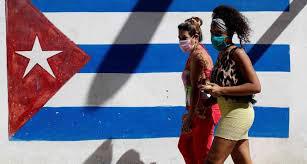
Photo: Taken from the Internet
Cuban women will always be at the side of the Revolution, in defense of the principles and rights conquered for more than six decades. This was emphasized by Teresa Amarelle Boué, member of the Political Bureau and secretary-general of the Federation of Cuban Women (FMC), an organization that, with that conviction, as part of its essence, will reach its 61st anniversary.
In the midst of the media misrepresentation campaign against Cuba, she referred to Granma that fighting it is among the Federation’s priorities: “We are an organization that has legal authority, a non-governmental organization, but that does not mean that we are against the Government or the leadership of the Revolution, because it was the Revolution that dignified Cuban women and that is what we defend.
“We defend the Revolution because we want that in Cuba women have the right to employment, that there are schools, free education and that our women can be more than 62% of university graduates,” she said.
In another moment of her statements, during a meeting held with the press, she highlighted the importance of the National Program for the Advancement of Women. “Women have to know what the Program proposes; this work we are doing in the communities, the laundromats we are increasing, the strategy itself on violence, which should come out in the next few days with a legal norm; the work we are doing in the Women and Family Guidance Houses.
“We must start in the communities a workshop on gender violence, and we are also working on training the Police and legal personnel on everything that has to do with women’s rights so that they are in a position to exercise a better role in this regard.”
She said that next August 23 the FMC will reach its 61st anniversary with the motivations left by the 8th Party Congress. She pointed out that they will organize dialogues among women in each of the municipalities, and the Fidel and the Revolution of Women workshops, on the occasion of the 95th birthday of the Commander in Chief, always respecting the epidemiological norms.
Among the actions to be carried out in the coming days are a process of deep community intervention to stimulate citizen participation in the communities, as well as volunteer work, special matinees and recognitions to artists, founders and outstanding women in the fight against the pandemic.
The tribute to Vilma Espín Guillois will take place on August 23 at the Second Front, in the mausoleum where her remains rest. The commemorative day will also include the presentation of the Mariana Grajales and Ana Betancourt orders, the August 23 distinction and the 60th Anniversary stamp.
How to end fertility responsibly?

How to end fertility responsibly?
Several techniques and methods exist in Cuba for women and men to end fertility in a responsible way. Are they accepted in the same way? Do cultural patterns and gender inequality influence the most used ones? Juventud Rebelde approaches the issue from three territories of the country
Authors:
 Liudmila Peña Herrera,
Liudmila Peña Herrera, 
Lisandra Gómez Guerra,
Dorelys Canivell CanaL
Published: Thursday 13 May 2021 | 10:30:46 pm. Updated: Friday 14 May 2021 | 03:55:27 pm.
Translated and edited by Walter Lippmann for CubaNews.
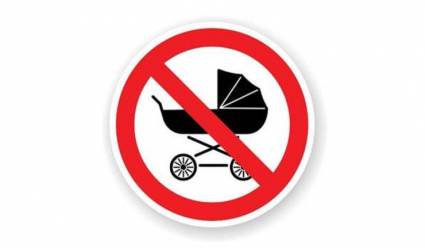
Contraceptive method. Autor: Juventud Rebelde Publicado: 13/05/2021 | 10:08 pm
Every time María Alejandra’s menstruation is late, she and her husband’s pulse quickens. The 35-year-old woman jokes that surely the female is coming, behind her boys, and he makes a face like he wants to pull his hair out, because “two are more than enough”. Then she returns to the subject that was almost forbidden that afternoon when he told her that he agreed to opt for male sterilization (vasectomy). However, it all remained a fleeting phrase.
“We had that conversation in front of my mother-in-law, who, upon hearing my proposal, screamed her head off,” says this Havana native, who currently uses condoms as the only contraceptive method, which was difficult to obtain more than a year ago.
There are many people who face the dilemma of finding the best way to control birth control or to put an end to their fertility. Ideally, the decision should be made in a consensual manner with the couple, but this is not always what prevails.
Family planning: a women’s issue?
The 48th edition of Cuba’s Health Statistical Yearbook -which contains updated information up to 2019- states that intrauterine devices (IUDs) had the highest percentage (52.2 percent in that year) of contraceptive coverage, followed by female sterilization (tubal ligation), which reached 22.6 percent in 2019.
According to that document, this last value is the highest recorded since 1995 (the date from which the comparisons start). Other contraceptive methods referred to were pills, injectables and condoms. It is worth noting that male sterilization was not included among the options, at least not reported.
So common, it seems natural to many people that birth control is mostly a female concern, even if there are men who are willing to take a leading role.
A survey conducted in the streets of Sancti Spiritus shows the prevailing patriarchal ideology that affects these decisions. Among the opinions identified with this type of concepts, those that stand out are those that maintain that women should worry more because men have children, but if they want to, they do not raise them; if they change their mind after tubal ligation, they can go to the doctor and he will always know what to do.
The “discomfort” involved in the use of condoms and the discomfort associated with IUDs were also mentioned. Another of the ideas naturalized by popular opinion is that “if a woman has a cesarean section, she takes advantage of it and gets her tubes tied”.
This is confirmed by Claudia Bernal Castillo, who opted for tubal ligation surgery. We didn’t even talk about it at home,” explains the 32-year-old. If we only wanted two children, and we already had them, why let that moment go by”.
This is one of the reasons that move patients to request the surgical procedure to the Sancti Spíritus doctors Omar Rangel and Miguel González Bellón, specialists in Gynecology and Obstetrics, who assure that it happens “as a consequence of machismo”.
“This is a definitive and irreversible method of family planning. Although the application of methods to reverse it has been registered, the predominant thing is the appearance of ectopic pregnancies, which are a danger for the woman”, says Bellón.
Dr. Rangel adds: “It is always explained that it is not necessary to perform the procedure during the cesarean section, because it is more invasive and can generate a greater number of maternal deaths, since it involves a surgical intervention. It can be performed laparoscopically -which is less invasive and less risky- 48 hours postpartum”.
The possibility of complications was what made Yaritza Cabrera, 36 years old and a resident of the capital, desist from this procedure, minutes before the cesarean section. “When they were preparing me for the operation, including the oxygen mask, I vomited and almost choked. I was afraid that my blood pressure would rise, because I became tachycardic, so I told the doctor: ‘Forget about the ligature,'” she recalls.
Although both physicians from Sancti Spiritus agree that requesting this procedure is a woman’s right, they recommend it, especially under certain circumstances. Dr. Rangel explains that it is done up to the age of 39 and 40, and never before the age of 24. He also states that it is sometimes necessary to perform it on multiparous patients, those with serious psychiatric problems, decompensated diabetics and those with renal insufficiency.
Both consider that there is an urgent need to improve the culture regarding the use of multiple contraceptive methods: mechanical, endocrine, implants, tablets, etc., so that surgical intervention is not recurrent. “In the family planning consultation, which should be attended as a couple, providers should be trained to provide guidance, according to all the possibilities, so that the best option is chosen,” concluded Dr. Bellón.
Can men decide?
Among the techniques used to write this report was a qualitative survey carried out in a private group created by this team for journalistic purposes (Experimento para textos periodísticos) on the social network Facebook, which is made up of 900 users residing in the country.
Most of the women acknowledged that when they decided to end their fertility through surgery, they made the decision alone, without consulting their partner. Some responded that they never thought of proposing to him to have a vasectomy, and it is noteworthy that several of them tried to negotiate to see which one would work best for them.
Several tried to negotiate to see which of the two would undergo the surgery, but it was not possible to reach an agreement. Two girls even proposed to their husbands to have it done and they were offended.
This is still a taboo subject,” says Yinet Córdova, from Holguín. I used condoms for many years because I couldn’t use other methods, and I gave them up when I was sterilized endoscopically, because my husband refused to have a vasectomy”.
For Rouslyn Navia, a resident of Havana, the story has not been much different. At 37 years old and with two children, she does not intend to get pregnant again. She did not opt for ligation during the cesarean section “for fear that the recovery would be more painful. Then I tried to negotiate with my husband to have the vasectomy, since he has several children. He did not agree.
Vasectomy is a surgical technique whose purpose is male sterilization, when the man has decided to put a definitive end to his fertility. However, urologist and andrologist Ramiro Fragas Valdés, specialist in Urology and master in Sexuality at the Cira García Central Clinic, in Havana, warns that, although it can be performed since the 1970s, “it is not practiced as much as it could be because, when couples are referred, they think more about tubal ligation, and because it is the woman who generally opts for sterilization. The idea is to change that, especially because vasectomy is a much simpler and less risky procedure for a man than tubal ligation is for a woman”.
One of the issues that prevent men from opting for this technique, in addition to prejudice, is misinformation. In the survey, most of the participants assured that they would not dare to have it done, and considered that the subject should have a greater presence in the media.
Although some said that “it is not a necessary method if the woman can get pregnant” and that “they say it is very painful”, it is striking that more than half of the men said that “it should be a more accessible option” and “information should be offered in family planning consultations and in sex education in schools”.
These opinions coincide with the opinion of Dr. Fragas, who believes that “if we break the taboo of machismo, if we make the method more widely known, and if we get family planning programs to offer it as an option to couples, vasectomy would be practiced much more than female sterilization, we would save resources, and we would save money. With female sterilization, we would save resources and take better care of women”.
Vasectomy: quick and precise
T is a middle-aged man, a doctor, from Havana and childless. He does not want to mention his name, but agrees to share his experience because, despite wanting to undergo the surgery for many years, it has not been possible for him to do so. For years, it has not been possible for him. He says that he never wanted to have offspring, which is why, since he was a medical student, he asked about that possibility.
“First, it was not feasible because I was very young,” he recalls. Then, because I had no children. Later, I was frightened by the unwillingness I found to receive help with postoperative pain management. When I told myself I could handle it, the childlessness story came back.
T’s doubts and concerns may be those of other men. That is why we asked Dr. Fragas, also a member of the board of directors of the Cuban Urology Society, about these issues. The specialist explains that “vasectomy is a very simple surgery that is performed in 15 minutes. The rest period is two or three days, and sexual activity can be resumed after a week”.
However, he believes it is necessary to be clear that “the reversal -in case the patient wants to have children later- takes at least two hours because it is done through microsurgery, and the results are not always favorable. Therefore, it is generally recommended for couples in which the man and the woman are over 35 years old. It cannot be a hasty decision and should be promoted among stable unions, with two children or more”.
Dr. Fragas has extensive experience in this type of surgery, and between the incisional method and the one that does not require a scalpel (Li technique), he prefers the latter, although in his opinion both are equally effective.
“There are patients who feel safer with the traditional technique, with a scalpel,” explains the doctor, who in 2009 presented in Barcelona a casuistry of approximately 400 patients who had undergone surgery, together with other experts. It is also very simple, and one or two small incisions are made. Li’s technique does not change much, but the fact that it does not use a scalpel, that it is performed through a single incision in the median raphe under local anesthesia, makes it more attractive”.
The urologist assures us that the experience of these men, when the doctor makes an appointment to see them to see how it went, is very favorable. “They are very happy with the method and recommend it as something safe and simple,” he says.
Dr. Iliana Armas Ampudia, First Degree Urology and MGI specialist, and member of the Provincial Infertility Consultation in Pinar del Río, corroborates her colleague’s explanation and adds:
“The patient walks in and out of the consultation and should not have any complications. However, it is a very unusual practice. In more than ten years in the specialty, I have barely performed four, and I have colleagues who have performed one or two. Society still has many taboos about these issues. Men should know that it does not affect virility: their erections will remain the same, as will their ejaculation, only free of spermatozoa”.
He also points out that “the couple should continue to take care of themselves for up to three months after the surgery to completely avoid any risk of pregnancy”.
Voices from experience
At the age of 67, Georgina Venegas, from Pinar del Río, remembers with gratitude the decision of her husband, journalist Rafael Cao, now deceased. He decided to have a vasectomy so that she would not have to undergo a ligation. It was the early 1990s, and Georgina had undergone two back-to-back terminations.
“We had one child together, and he had another from a first marriage. I had already turned 39, and I told him, ‘I’m going to have to tie the knot, unless you do.’ I just had to ask,” she says.
After a tenacious search in surgical records and operative reports by the nurses of the Urology service in Pinar del Río, this team managed to talk to Alfredo Miló, who underwent a vasectomy in 2019 to prevent his wife, already with two very complex pregnancies due to preeclampsia, from having to enter a salon again.
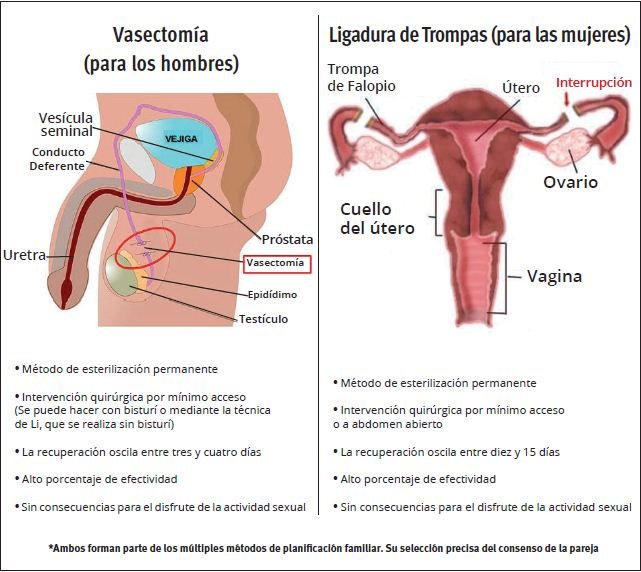
“Before deciding on a vasectomy, we looked at other alternative methods, but none of them satisfied us. I would tell her, ‘I don’t want you to go to the operating room,’ and she would say, ‘I do want you to go, but to have a vasectomy. Not knowing what it was like and with my machismo in front of me, I did not agree, and so we worked for several years, until I was convinced.
“During the operation I felt no pain. The recovery was perfect. I can tell those who doubt that vasectomy transports you to a world where worries are over.”
His wife, Yamilka Rodriguez, confesses that it was not at all easy to convince him, because “there was a lot of pressure from society and even from the family; even when he entered the salon they told him not to do it”.
Today, Yamilka says, not many people are surprised:
“Women ask me how I got her to have it done and men tell her: ‘You’re crazy, no woman deserves to have that done for them’. It is a deep-rooted machismo. In the face of that, I say that we are happy”.
As this is an issue that is discussed (when dialogue is achieved) within the couple, in the Family Planning Consultation of the municipality of Pinar del Río, each of the options available to avoid pregnancy is explained. In this regard, Dr. Lázara Medina Martínez, who has a diploma in Comprehensive Care for Women and a master’s degree in Communicable Diseases, points out that “vasectomy, in particular, is almost never accepted”.
From 2012 to date, during the time she has been working in this practice, only two couples have opted for this method, in both cases because the women had pathologies that prevented them from undergoing ligation.
Acts of love and responsibility
In sexual and coupled life, as in social life, everyone has their own contexts, realities and determinants. It is true that as a country we are gaining more and more information and debate on topics that have traditionally been considered off-limits, or only of interest to sectors such as women, in the case of birth control and the end of fertility; but as long as there are options that have not been taken advantage of because of macho cultural patterns, there is still much to communicate and discuss.
On this path, there is nothing better than to seek guidance from specialists and positive experiences. Fortunately, when one looks to the horizon, one finds examples such as those of Ernesto Herrera, from Holguín, who has just become a father. He is sure that, “when the time comes, vasectomy will be the option I will take. It is safer and less traumatic than a ligation for my wife. It is also an act of love.
For March 8 (and beyond)


For March 8 (and beyond)
In what way and where, by whom and with what effects do we construct the image of what a woman is? Better yet, in what way are the limits of what is considered – at a given moment in a particular society – possible for a woman to be and to project?
Translated and edited by Walter Lippmann for CubaNews.
A friend of mine posts on her Facebook wall a comment in which she regrets what she considers to be an example of insufficient diversity in the images that, on the television screen, were used to present (and represent) Cuban women in the celebration of March 8. My friend is black, with a deeply dark skin tone.
Here’s a topic, I say to myself, and then I remember that years ago I wrote an article for the newspaper Juventud Rebelde about the transformations that -in terms of beauty standards- had taken place in the country since the years of my childhood.
The article focused on the perceptions and meanings of black people’s hair and hairstyle and, on this basis, proposed assessments in which racism and freedom, the hidden mechanisms of domination and the battles of the subjects in search of their real emancipation were confronted.
After that I wrote two other articles, which were not published at the time:. The first aimed to analyze the connections between obesity, beauty and social control; the other took as its motif the case of a woman in England who had announced on her personal website that she would stop shaving her legs and who – from then on – began to receive dozens (eventually hundreds) of denigrating messages, some of which contained threats to her physical integrity.
How and where, by whom and with what effects do we construct the image of what a woman is? Better yet, in what way are the limits of what is considered – at a given moment in a particular society – possible for a woman to be and project? What participation do we have, even those of us who are willing to swear that we are not part of the process, in the infinite number of actions through which this “ideal” of what is supposedly feminine is molded?
This inevitably leads us to understand (and propose for debate) not only the responsibility in the production, distribution, control and consumption of images, but to lead us to a point where we are forced to ask ourselves: What have we done or do? What role do we play in the various forms and scenarios in which actions of micro-oppression of women are manifested?
Another friend tells me about the time when, at the exact moment of wearing a new dress for a night out she was looking forward to, she discovered -just as she arrived at the place- that the rush had made her mix up the ornaments and that she had put on two different earrings. She doesn’t know how much she taught me and I learned from her response when, contemplating her face in the mirror of a bathroom on-site, she said to herself: “it doesn’t matter: you are the fashion”.
I admire that way of not obeying the dictates of a codified norm, which pretends to define what you are in a perverse game, where visuality is supposed to make transparent the moral condition of the person and even her history itself. I admire that inner strength and will to self-affirmation.
A third friend uses her menstrual emissions, exactly that which, in a more evident way, transmits the “weakness” or “flaw” of the woman, to create -with that intimately personal matter- works of art. As in the previous example, the logic that presides over the action is that of the search for and expression of the most absolute freedom.
What is a woman, where is she, what are her limits, how is she represented/presented?
The face perfectly aligned with the Hellenic beauty patterns or the very dark skin accompanied by thick lips and a wide and flattened nose; the youthful figure that communicates agility and the other that moves with effort due to age; the straight hair, the implants, the straightening under the effect of keratin, the hair in the form of “afro”, in the so-called “carreritas” or in long and powerful “drelos”; the thin or overabundant, obese contour; the gesture of a dapper style or with a wider arc in the movement of the hands; the image of a “traditional” femininity (in which ideals of “fragility”, “delicacy” and “sensuality” prevail) or the reverse of the “masculinized” female, which is usually attributed to the lesbian; with tattoos, “piercings”, hair dyed in unusual colors (green, blue, orange): it’s all women.
Peasant women, highly skilled professionals, housewives, workers in an industry or construction site, we need images of the most extraordinary diversity possible to “refresh” our images and approach women, ask questions, get closer to their struggles, offer them solidarity and push together with them the limits of presence, representation and participation in new worlds.
And that is what a Revolution is: a new world.
I end with a personal story. A few years ago my children Kenneth, Karen and I got tattoos. On that occasion the one that my wife dreams of for herself was left pending: the Elvish word for FREE.
Preventing Gender Violence

Preventing Gender Violence: An End to Breaking the Silence with Unexcused Looks
 By Paquita Armas Fonseca, a Cuban journalist specialized in cultural issues. She is a regular contributor to Cubadebate and other digital media such as La Jiribilla, CubaSi and the Cuban Television Portal. She was director of El Caimán Barbudo.
By Paquita Armas Fonseca, a Cuban journalist specialized in cultural issues. She is a regular contributor to Cubadebate and other digital media such as La Jiribilla, CubaSi and the Cuban Television Portal. She was director of El Caimán Barbudo.
February 4, 2021
Translated and edited by Walter Lippmann for CubaNews.
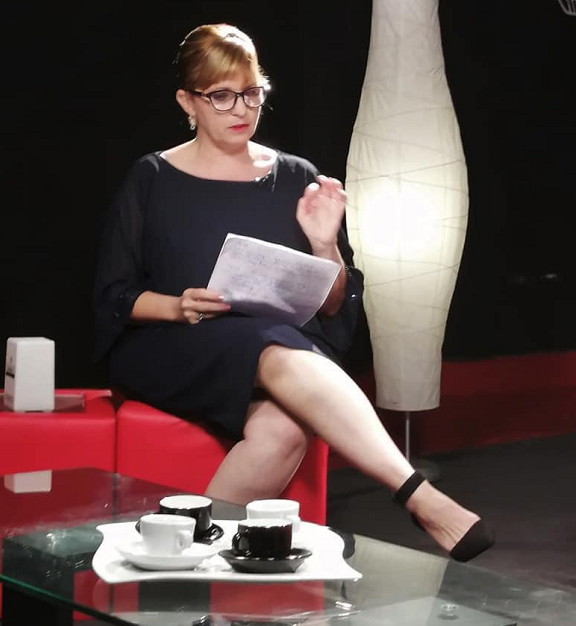
Beatriz Torres Rodríguez is the Bety who once a week has been talking about Sexuality and daily life for 20 years. Photo: TVC Portal.
Degree in Psychology, PhD in Psychological Sciences, Master in Sexuality and Sexuality Pedagogy, Professor and Senior Researcher, President of the Cuban Multidisciplinary Society for the Study of Sexuality (SOCUMES). Beatriz Torres Rodriguez is the Bety who once a week has been talking about Sexuality and daily life for 20 years, first on CHTV and then on Canal Habana.
That has been one of her jobs as a communicator, she has had others (you will find them in this text) and soon she will be the host of Miradas sin excusas, a magazine that will precede the awaited series Rompiendo el silencio (Breaking the Silence). “The panels do not comment on the chapters of the serial, but make reflections and look for alternatives and turning points to prevent gender violence to give alternatives for coping with it” stresses this charismatic psychologist:
-Why Psychology? Is there a gene in the family?
When choosing a career as a teenager, generally as in my case, there is no effective professional orientation, but I have always been a passionate reader and lover of cinema and I was attracted by the characteristics of the characters, how they faced conflicts, how there could be different alternative solutions, which not only depended on the environment in which people developed, among other elements and that approached the studies, which I later learned, were the components of the psychological framework. Also, because from what I knew was a helping profession, at that time with the vision of patients with psychiatric disorders, which constituted and constitute for me a great mystery, despite the years of professional practice.
There is no specialist in my family related to this science.
-Why sexology?
Since I was a student at the Psychology Department of the University of Havana, I became interested in this subject and received extracurricular courses given by what was at that time the National Group for Sex Education. At the same time, I began my professional practice in a Mental Health Center, and I saw how mental health disorders, whether the most complex and chronic or the most acute, mostly have an impact on sexuality and life as a couple, at different ages of life, which leads to present, from discomfort related to this area, to disorders, with a great burden of suffering in most cases.
This was later enriched by working at the Center for Medical and Surgical Research, where I expanded my diapason to the accompaniment and treatment of patients with chronic diseases, especially non-communicable diseases such as diabetes, hypertension and chronic kidney disease among others and the impact they have on sexuality, not only because of the disease itself, but also because of all the stigmas and prejudices of the patient himself, the couple, the team of professionals and society, mostly due to the lack of knowledge or undervaluation of these issues and the impact they have on the welfare of people regardless of the disease they have.
For ten years I have been the president of the Cuban Multidisciplinary Society for the Study of Sexuality (SOCUMES), one of its multiple lines of research is precisely gender violence.
In recent years I have also participated in counseling for women in situations of gender violence, where the implications are very marked in their sexuality, self-esteem and well-being, among others. In other words, for me it is an area of knowledge of great need and sensitivity and that, in our culture, since it is considered by the majority of the population as a private matter, people delay a lot in asking for help and in some cases do not do it at all.
-Where and when did you start as a communicator?
I started in 2000 on TV in CHTV, in its magazine, with the session Sexuality and daily life, with journalist Dianik Flores, a session that I later continued in Canal Habana, since its foundation 15 years ago, together with a group of prestigious directors and hosts such as Sandra, Magdiel and the entire production team, which has allowed me to grow as a person and as a professional and a systematic dialogue with viewers, because I keep a space within the session to answer them, based on the questions of the topics presented in the space. This exchange has been very enriching and I have been given alternatives of help or orientation to different services in the cases I require. Hearing, analyzing and learning from other colleagues whom I admire and who also have their section in the Magazine, has been very useful for me.
I have participated in other TV programs, such as El triángulo de la confianza, De tarde en casa, Entre tú y yo and Pasaje a lo desconocido, among others.
In addition, since 2005 and for several years, I developed in the newspaper Trabajadores a digital consultation on sexuality in their health page. The session was called “Let’s talk about sexuality”, which for years was a very interesting experience, receiving various questions from people of different ages, marital status, schooling, even from other countries, which allowed me to get feedback on the issues that most often concerned the population about sexuality and life as a couple and that many did not dare to raise, neither to their own partners, nor in the space of consultation, so we could see the usefulness of this space. I would like to acknowledge the collaboration of the journalist Carmen Alfonso, in charge of this health page.
I have seen the importance of communication on these issues in the media, since it allows a large group in the population to become aware, reflect and learn. At the same time, as a specialist, it has helped me to be aware of what concerns the population the most, in order to be able to offer help alternatives.
-Have you taken a speech course?
In 2008-2009, together with other specialists in charge of sessions at Canal Habana and a group of journalists, I took a speech course, which was very useful and a necessary learning experience.
-How long did you prepare for this job?
I was invited to be the host or moderator of the panels of specialists of the magazine Miradas sin excusas, before the presentation of the chapters of the serial Rompiendo el silencio. Although the preparation time was short, we had the necessary and deep table work, both with its director and screenwriter Elena Palacios, Altair Reyes, the head of production and advisor Karina Paz, magnificent professionals, with whom we developed an excellent teamwork.
In addition, for some years, I have had an approach from the research with the problems related to gender violence, I was one of the coordinators of the Consensus of Gender Violence, organized in 2018 by SOCUMES and in the meetings of researchers in gender violence, organized by the Oscar Arnulfo Romero Center. For the last 5 years, we have jointly organized a colloquium on this topic. For three years I have been part of the counseling team for women in situations of gender violence in this institution. All this has made it easier for me to raise awareness and deepen my knowledge of these issues.
-What topics will be discussed?

Photo: TVC Portal.
It is a specialized magazine of analysis of the different expressions of gender violence, which will serve as a framework for the two seasons of the series Breaking the Silence. It tells the stories of women and girls in situations of violence, in its different forms of presentation, from the most recognized and obvious, such as physical violence and sexual abuse, to the more subtle, but no less serious, such as psychological and other types of violence. In its second season, it expands and diversifies to other forms of violence, such as violence against men. There is a representation of the different contexts where it can occur, such as the family, the couple, school, work, among others.
Its first season was intentionally broadcast in early December 2016, in the framework of the Day for Non-Violence against Women and Girls. For the first time, a national teleseries addressed this issue of gender violence as a central axis, which continues in its second season as a common thread.
The themes of this second season are related to:
Sexual violence against girls, adolescents and adult women in its different forms of expression.
The consequences of gender violence affect the main victims (women), but also the rest of the family members and the perpetrators themselves.
One of the consequences of GBV is the reproduction of violence, particularly for women in the double condition of victim-victimizer.
Symbolic violence that uses women’s bodies to exercise control.
Gender violence towards homosexual men, homophobia, transphobia, paternity and homosexuality.
Child abuse.
Rape within the family.
Violence between men.
Stories of characters with their conflicts, limited situations and responses to them are presented, with the aim of provoking recognition, analysis and awareness of this phenomenon of gender violence.
-Could you comment on the specialists?
The panels were composed of specialists from different fields of knowledge, who had two characteristics in common:
They were experts in their fields of knowledge and in issues related to GBV.
They are very sensitive to these issues.
We had 58 appearances, according to the characteristics of the topics, there were experts who participated in more than one panel on several occasions. Psychologists, Sociologists, Jurists, Journalists, Anthropologists, Pedagogues, Doctors, Historians, Filmmakers, Communicators and Photography Professionals, among others, were represented. Teamwork was achieved and the most important thing, in my opinion, is that we sought to enlighten the population on these issues, to see the signs of GBV, its causes, repercussions in the family, society, the different alternatives to face it and where to find turning points in the different situations that arise, in order not to reproduce violence and, most importantly, to prevent it.
-Any recommendations for viewers?
Not to be alarmed by these issues, since the important thing is to recognize the different forms of GBV, and that this is a social problem of such importance, that to stop at the number, or if it is more or less frequent, is not the essential thing, but if a single woman, girl or any person is in these situations, it deserves all our effort and attention. The most important thing is to PREVENT, so that GBV and any form of violence does not become naturalized. Hence the political will of our country and its institutions to achieve an effective, comprehensive and integrated response. This magazine is part of this effort, of the many that are needed.
The FMC, together with other institutions, is leading this strategy, which is already showing signs such as the helpline and the Women’s Advancement Program, among others.
-Is there anything I haven’t asked you or anything you’d also like to say?
Finally, I would like to thank once again the entire team of the magazine and Ms. Mareleen Díaz Tenorio, with whom we had a systematic exchange during the entire filming process, since she was the capable advisor of the series Breaking the Silence.
(Taken from TVC’s website)
Granma Explains Feminism


SUBHEAD
Feminism
My mother asks me, after reading something someone posted, what feminism is. I explain. She, who is 80 years old, looks at me, and before getting up from the armchair, she tells me in a casual tone: “Son, here, since 1959, we call it Revolution”.
Translated and edited by Walter Lippmann for CubaNews.
Author: Ernesto Estévez Rams | internet@granma.cu
February 3, 2021 00:02:34 AM
She confessed to me several times that she danced rock ‘n’ roll. The white variant, which was the one that became popular in Cuba, that of Elvis Presley. When she told me that she danced rock ‘n’ roll, she meant that she used to get her hair disheveled dancing to that devil’s music. She spun around, jumped, was lifted up and thrown to land again to the rhythm of the music. A neighborhood policeman, intolerant and arrogant, came with a lemon in his hand, and made the men drop the lemon inside their pants to see if it would roll down one of their legs. If you didn’t fall, you were in trouble. For the ladies, a tape measure with a visible red mark. Measuring the length of the skirt above the knee, if it was below the scarlet line, you were in trouble. Those were times when you couldn’t talk much with the police.
At that time, she sewed with her mother and sisters to earn a living and took a course in interior design as a way to improve her skills. She was the face in the ECLO of an American food brand. Standing up, smiling, she showed the products and offered samples for consumers to taste the wonders of what was advertised. Her luck wasn’t the worst either. If she had been black, she was useless as an image. For those of black complexion, their lucky destiny was to be a maid, or a servant, whatever you prefer to call them.
Then the Revolution triumphed. She enlisted as a volunteer teacher and was a compañero of Conrado Benítez. Despite her youth and inexperience, she was put in charge of several boarding schools. They were entire neighborhoods converted into schools, once run by the bourgeoisie or their cronies. Now, a school for poor women, peasant women, urban women, humble women.
Her sister also enlisted as a literacy volunteer and became a literacy teacher. The other sister, the eldest, the same luck, and what luck! They became teachers, they taught. They learned. She, the director of the school, knew all of La Lisa, La Coronela, Playa. The houses of the officers of the defeated army became schools, she became the teacher of other women. In the photos, the microphone higher than her physical stature. Speaking, guiding, directing, raising her arm in harangue, waving her hand.
She was a delegate, president of the CDR, militia member, company leader, Party militant. She was white, she married a black man from Guantanamo. A black man who fought in the underground, a black man who became a university student. A black man who is still by her side today. He was a teacher, a cane cutter, a company leader, founder of the Party. And along the way, at some point, they had time to have children. They, the two of them, neighbors to anyone, not unlike so many others in the same place, in the same circumstances.
My mother asks me, after reading something someone posted, what is this feminism. I explain. She, 80 years old, looks at me, and before getting up from the armchair, she tells me in a casual tone: Son, here, since 1959, we call it Revolution.
One Story, Multiple Readings

One Story, Multiple Readings
Published: Tuesday 12 January 2021 | 08:41:40 pm
When talking about the Middle Ages and Antiquity in Europe and its nearby territories, it seems that women were always subject to male power
Author: Mileyda Menéndez Dávila

Translated and edited by Walter Lippmann for CubaNews.

Viking culture promoted equity between men and women. Author: Taken from www.filo.news Published: 12/01/2021 | 07:57 pm
When talking about the Middle Ages and Antiquity in Europe and its nearby territories, it seems that women were always subject to male power, without the right to participate or manipulated in government debates, relegated to the role of feeding themselves, excluded from war, science or other basic functions for the human group to which they belonged.
This is what those who consider the concept of equity as a recent “invention” say, and how they describe matriarchy as a system of male slavery and humiliation.
Recent archaeological findings and new readings of ancient texts from a feminist perspective agree that, although misogyny and patriarchy were widespread in many regions with similar expressions, there were civilizations in which women lived alongside men and played important social roles.
Supposedly barbaric and backward cultures, such as that of the Vikings and the one that inhabited India before the Aryan invasions, left evidence of a respectful and even venerable treatment of women and people of non-binary gender in their beliefs, traditions and social structure.
Preserved manuscripts from those times and legends that have survived orally indicate that in addition to respecting the right of women to decide about their bodies and to choose partners of any caste, an infinite number of tribes and clans validated non-heterosexual practices (common among warriors and priestesses), and ambivalent gender identities, visible in graphic representations of everyday life and of their gods and goddesses, which also abounded.
Respectable evidence
In the case of the Vikings, the journal Economics and Human Biology published a study that correlates the nutritional health of the Scandinavian population between ten and 15 centuries ago with the social values that intended equity by gender and age.
Biochemical tests confirm, by the quality and development of the bones found in several settlements, that women were free and active, and from birth they ate at the same time as adult men, not at the end.
Many were trained for war, fishing and hunting, led groups and inherited positions and properties. The most revered were the Valkyries: large women who collected dying and dead bodies in battle to help them move, according to their traditions, into the eternal and sacred world they called Valhalla.
Those customs of the Nordic “savages” were a shock for the descendants of the Greco-Latin culture, who built palaces and roads, dominated the arts and agriculture, but in their cultured cities women had no right to study or own property, did not talk to other men and could be given away as servants by their fathers, brothers, husbands and sons.
The legislations of the current Nordic countries, heirs to the Viking culture, guarantee effective and palpable justice without gender discrimination, while many states born of the Judeo-Christian forge cling to a patriarchal hierarchy in homes and social spaces that has unleashed many wars and justified discrimination for hundreds of generations.
Other archaeological findings of the mid-twentieth century in well-preserved ancient cities, but hidden by nature, confirmed the respect for women as a source of life in the Indus civilization, without such deference to represent for men an economic or social disadvantage, as told in the book Tantra, the cult of the feminine, which we can provide to our readers by digital means.
That tradition of honoring the Mother as a social being (not only as a producer of labor) disappeared with the caste system imposed after the northern invasions, when girls and women became, along with the cattle, a resource to be exploited by the conquerors to survive in hostile terrain and to adapt genetically to the climate.
Also in pre-Columbian America and the original African societies there were stages and cultures in which women flourished alongside their male counterparts. As in other processes of conquest throughout the world, were the hosts “civilizing” which established the male hierarchy to control the lines of inheritance in the territories razed.
By (re)knowing these versions of common history, humanity is better able to write its present and place dignity as the essential value promoted by the Magna Carta of almost all nations.
Cuba Updates on Violence Against Women

Cuba to Revise More Than 50 Laws to Update Regulations on Violence Against Women and Girls
Cuba will review more than 50 laws, as soon as the commissions are created for each of them, to decide whether to create a comprehensive law to address violence against women or to include it in other laws, said Dr. Mariela Castro Espín, President of the National Center for Sex Education, in an interview with the Cubasí website.
By We Editor
internet@granma.cu
December 2, 2019
Translated and edited by Walter Lippmann for CubaNews.
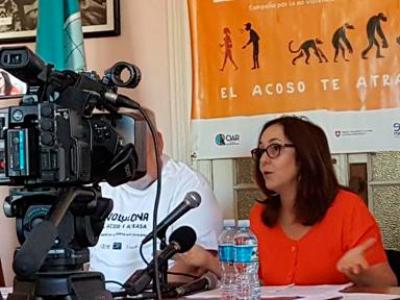
Photo: Cubasí shot
Cuba will review more than 50 laws, as soon as the commissions are created for each one of them, to decide whether to create a comprehensive law for the attention to violence against women or to include it in other laws, declared in an interview with the Cubasí portal Dr. Mariela Castro Espín, President of the National Center for Sexual Education (Cenesex).
Cenesex, in recent times, joins more institutions and organizations of civil society and the State to advance campaigns and concrete actions that help to take better the policy of protection to the woman to the legislative changes that arise from the constitutional change and that it has contemplated to attend this reality, pointed out the specialist.
Castro Espín pointed out that the Cuban State deals with this issue, as evidenced by the fact that during the 1st International Symposium against Gender-Based Violence, Sexual Tourism, Human Trafficking and Prostitution, it was agreed that within the National Program of Education and Sexual Health, the Program of attention to all forms of violence would be addressed.
“In September we submitted to the Ministry of Public Health the proposal for a comprehensive education policy on sexuality and sexual rights.
However, she denounced the fact that there are attacks to discredit our institutions. Specific people based on the distortion of her words and efforts on the issue “and begin unfair attacks, without foundation, with a deep ignorance and ignorance, which do not help us move forward on the issue,” she said.
She also denounced the fact that “There is a lot of money, especially from the United States government, towards five main evangelical churches, which are trying to sabotage many initiatives. They are using this term gender ideology, which was created by a Catholic bishop in the 60s, precisely to discredit the international advances in the field of women’s rights and the thought of Marxist origin in relation to this issue. And our Revolution, as Fidel said, has the right to defend itself, it has the right to defend its social conquests, the rights that have been achieved in the Constitution and in the whole legislative system that is already being changed since the constitutional change”.
As a message to Cuban women, Mariela Castro sent the request that “we study, that we prepare ourselves well, because there are many people who fall into the traps of campaigns to discredit our efforts”.
She also called for not acting in isolation: “we have to unite, make alliances, because every time we make alliances and unite, we achieve effectiveness, we really achieve changes, so we do not play into the hands of the enemies of the Revolution, we unite among the organizations and institutions that are really working and that are open to all the ideas that are truly sincere and committed to revolutionary work.
In the middle of the National Day Against Violence Against Women and Girls, Mariela Castro Espín, about the origins of this social problem, said that it comes from centuries and has been expressed from a place of power. She also emphasized the role of the Catholic Church and how it has promoted nine centuries of persecution against women.
Today, she said, there are countries where women are totally enslaved and suffer greatly. Already in the 1970s, she explained, more specific terms emerged, such as femicide, which mainly alludes, from the work that Mexican anthropologist Marcela Lagarde has developed, to the irresponsibility and abandonment of the state in the face of the problem. There are studies that differentiate what is a homicide from a femicide and characterize them.
The director of CENESEX reminds us that the struggles for women’s rights around the world, the feminist movements, and women’s organizations linked to scientific study, have been contributing ways of thinking and acting on these issues, and proposals for laws have been emerging.
(With information from Cubasí)
The Fertile Seed of the Cuban Woman

The Fertile Seed of the Cuban Woman
The women of Santiago and Granma are now united in the beautiful story woven by the Federation of Cuban Women (FMC), in the 60 years they celebrated this August 23.
By Mailenys Oliva Ferrales and Eduardo Palomares Calderón
internet@granma.cu
August 23, 2020
Translated and edited by Walter Lippmann for CubaNews.
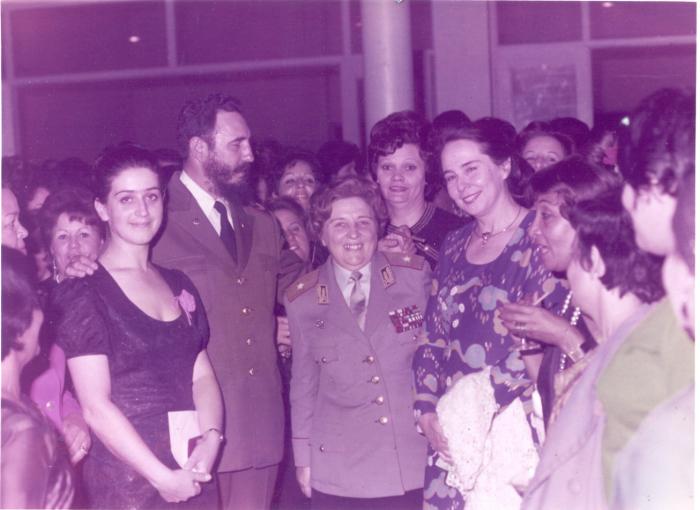
The women of Santiago and Granma are now united in the beautiful story woven by the Federation of Cuban Women (FMC), in the 60 years they celebrated this August 23
United by the Sierra Maestra mountain range and the waters of the Cauto River, in the struggles marked by Mariana Grajales, Canducha “la Abanderada”, and more recently by Celia Sánchez and Vilma Espín, the women of Santiago and Granma are now united in this beautiful story woven by the Federation of Cuban Women (FMC), in the 60 years they observed this August 23.
It was to Vilma Espín Guillois, a brave and sensitive woman from Santiago, that Commander-in-Chief Fidel Castro Ruz entrusted the creation and strengthening of the organization destined to work for full gender equality in the new society. This is why the FMC women of her territory made a firm commitment this time to dedicate the Vanguard flag and the national act for the date.
“For all the FMC women of the country it has been a year of intense work -considers Elena Castillo Rodríguez, secretary-general of the FMC in Santiago de Cuba-, first because we started it under the incentive of such an important anniversary, and then because the appearance of the pandemic changed the life of all Cubans and, of course, it imposed the reorientation of our work.
“Based on the Party’s motto in the territory: “With the effort of all, we will win!”, we did the same intensity of work from the Guantanamo border of Yerba de Guinea to the Granmense of Baire, and that allowed us to declare all the municipalities (9) as Vanguards, and to seal that result at the level of the country.
Based on the solid tradition that has kept it in the vanguard in recent years, Granma was very close, achieving vanguard status in ten of its 13 municipalities. It wa, a challenge that, according to the Secretary General, María Elena Hechavarría Carralero, was focused on strengthening its grassroots structures and community action.
“We are one of the links that the enemy imagines with weaknesses to try to distort the reality of the Island, but, considered by Fidel as well as by Raúl and Díaz-Canel, as bastions in each project undertaken, we have taken all the spaces to demonstrate that women are an essential force in the sovereignty of the Nation”.
THE VITAL HEARTBEAT OF SOCIETY
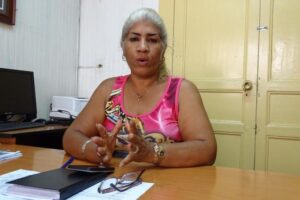
Elena Castillo Rodriguez, Secretary of the FMC in Santiago de Cuba Photo: Eduardo Palomares
For most of the 412,500 FMCers in Santiago and the 325,000 in Granma, one of the most important, humane and beautiful activities of recent times has been the challenge taken on from the COVID-19 pandemic, because not only was it to make thousands of nasobucos, but they also provided the fabric and thread, and then went to donate them in the neighborhoods, squares and workplaces.
In both territories, they also went voluntarily to the health control points, to the sanitation and hygienization of public areas, to the house-to-house investigation and, without thinking twice, not a few young people took the step to contribute in what was necessary in the red zone of hospitals and centers of isolation of suspects.
Perhaps there is something more emotional,” says Castillo Rodriguez, “than seeing a girl with a pharmacy card or a warehouse notebook buying medicine and food products for a vulnerable person, or for the members of the Federation who took care of the old man who lives alone and brought him the same food prepared for the family.
Our women have grown up during the confrontation with COVID-19,” says Hechavarría Carralero, “because they did not wait to be called, they began to spontaneously deploy initiatives and we generalized and brought them together so that their impact would be greater, and all this has had the moral recognition that contributes to new efforts.
Within this complex situation, both leaders agreed that the scourge of gender violence that has wounded the world so much, has not been an embarrassing problem for their respective territories, since the Women’s and Family Orientation Centers work preventively, and a differentiated work has been done in dysfunctional nuclei.
Through specialists, talks have taken place aimed at promoting family unity and curbing the tendency to burden women with domestic tasks. At the same time, through dozens of training programs, the FMC has held training courses in socially useful activities for women and men who are not working.
In this way, including in recent days, some of the so-called “choleras” received job offers in the state sector or on their own account, ranging from pharmacy and commerce clerks, technical services, gastronomy, barbers and other trades that reintegrate them with dignity.
IN FRONT OF THE FURROW
According to Castillo Rodríguez, “Hot spots” in her province are the fronts for food production that women share today. This is not because of the complexity of the work, but because of its importance. In addition to facing the pandemic, they moved to gardens and patios to plant short-cycle crops and medicinal plants, which are already bearing fruit.
A lot has been said about the initiative of the food production areas in Santiago,” he explains, “and those structures are already in all the municipalities, where, if in the agricultural ones there is parity between men and women, in the industrial ones the majority of the women are making bread, cookies, candies, preserves and dozens of assorted products.
Currently, the strategy concluded in the Second Front and that goes through the Third Front, is sealing each municipality with the patios incorporated into urban agriculture, and the creation of agreements for pigs, sheep and poultry, attended purely by women or jointly with the family, which provides them with meat, food, grains and vegetables.
The women of Granma also contribute to these forms of agri-food production, their presence in the mobilizations called for, and the empowerment achieved in the labor area, where they make up 67% of the technical force, and assume key management positions, from the base up to all levels.
VALIDITY OF VILMA
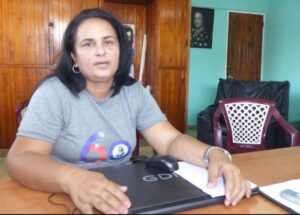
María Elena Hechavarría Carralero, secretary of the FMC in Granma. Photo: Mailenys Oliva Ferrales
Although the Commander-in-Chief considered the full incorporation of women as a Revolution within the Revolution, among the greatest teachings bequeathed by Vilma Espín is the defense of rights and the work she has conquered. This is why Santiagueras and Granmenses are now equally focused on confronting social indiscipline.
Her actions in the face of coleros, resellers and hoarders range from preventive work with people characterized by that anti-social behavior in the community, which has made it possible to detect soluble dysfunctional problems and the incorporation of 12 cases to work in Santiago de Cuba, to the support to order in the lines [in from of] commercial establishments.
Elena Castillo and María Elena Hechavaría emphasize the enthusiasm with which the FMCers have received the respective recognitions as vanguard and outstanding women. There is in a 60th anniversary celebrated in all the municipalities, in centers such as hospitals and of textile clothing, with high presence of women, and of course in the base.
In a special way, the Vilma Espín Memorial, located in the house where she lived and matured as a revolutionary, by turning it into a meeting point and even a staff for young clandestine fighters, once again hosted the Vilma en la memoria workshop, with the presentation of 28 research papers from the provinces of Granma and Santiago de Cuba, on the extraordinary woman.
Coinciding with the date and in view of the impossibility, due to the COVID-19, of the desired mass mobilization, a representation of the municipality of Segundo Frente paid homage to the eternal President of the FMC, Vilma Espín Guillois, in the name of Cuban woman, and before the rock monument that in the mausoleum to the heroes and martyrs of the II Eastern Front receives its ashes.
Pain and Pleasure in Childbirth

Pain and Pleasure in Childbirth
By Mileyda Menéndez Dávila
sentido@juventudrebelde.cu
June 9, 2020
Translated and edited by Walter Lippmann for CubaNews.
In the past century, obstetricians and gynecologists from various countries have defended the hypothesis that an important function of pleasure in its maximum physical expression is to prepare women physiologically for the intensity of childbirth.
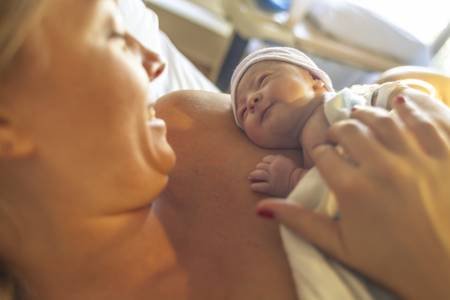
As a natural process, childbirth can be pleasurable… for some people too much. Photo taken from the site Bebés y más Autor: Tomado de Internet Published: 16/06/2020 | 09:07 pm
Although there are few studies available on the subject, it has been scientifically proven that orgasms can occur during labor. This phenomenon has been called a myth for centuries because in Western culture childbirth is associated with heroic pain and orgasm with pleasure of external origin (even if it is self-provoked), therefore, it is not acceptable that both concur in the same act without degrading stigmas.
In the biological field, things are not binary, as most conservative tendencies claim. In fact, since both processes are mediated by hormones and focus on the genital area (between the first and second chakra), there is reason to assume that the nervous system interprets painful signals according to very personal patterns, associated with the level of tolerance for physical pain, expectations with that pregnancy and the circumstances surrounding childbirth.
In the past century, gynecologists from various nations have defended the hypothesis that an important function of pleasure at its maximum physical expression is to prepare women physiologically for the intensity of childbirth.
In the 1970s, the Frenchman Michel Odent promoted actions to make birth a moment of joy, not of sacrifice or shame. Original cultures see it that way, and today new voices are raised in favor of the body acting according to its ancestral knowledge.
Adrenaline, oxytocin, dopamine… A whole cocktail of hormones is unleashed during labor, each at its own pace. And if the mind accepts the right to experience the act of giving life as pleasure, the sensations can be strong, but fluid, without panic,. That “permission” helps to interpret them without guilt, in some cases with similar enjoyment of what for that woman is the reference of an orgasm, as occurs in a sudden consensual sexual act.
Nutritional concern
Dr. Odent was also one of the driving forces behind breastfeeding in the baby’s first hour of life because of its health benefits for both of us.
Although formalized reports are rare, some mothers describe something like an orgasm when they breastfeed. Such is the case of a 32-year-old Matanzas reader, who suggested including it in the list of involuntary pleasures because on a physical level it is enjoyable, but she thinks “that morally it is not right”.
She says her breasts have always been very sensitive and her partner manages to bring her to a climax just by stimulating them.
Once again, it is cultural assumptions that prevent that woman from enjoying her own body in a natural, unintended sense with morbidity.
Broadly speaking, Dr. Elvia de Dios, a trained psychiatrist and therapist at CENESEX (National Center for Sex Education), explains that the baby’s suction triggers the production of oxytocin, and that hormone activates the functioning of essential glands. These incluse the hypothalamus and pituitary gland, which in turn facilitate intense nerve discharges that stimulate the contractions of the uterus and help it return to its normal size and muscle tone.
The reader who consults is a privileged woman in the quality of her nervous reflexes, says the expert. It should not inhibit a reaction that is not associated with any sexual thought or call into question your motherhood.
For questions about orgasm and other issues of your sexuality or sexual identity, you can contact Dr. Elvia de Dios at the Cenesex telephone counseling service, which she provides Tuesday and Thursday from 9:00 a.m. to 2:00 p.m. at 7638-8405.
Subscribe to Blog via Email
| M | T | W | T | F | S | S |
|---|---|---|---|---|---|---|
| 1 | 2 | 3 | 4 | 5 | 6 | 7 |
| 8 | 9 | 10 | 11 | 12 | 13 | 14 |
| 15 | 16 | 17 | 18 | 19 | 20 | 21 |
| 22 | 23 | 24 | 25 | 26 | 27 | 28 |
| 29 | 30 | |||||

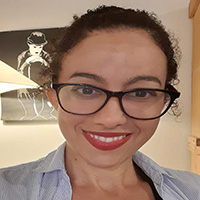
You must be logged in to post a comment.